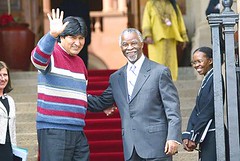
President Evo Morales of Bolivia With South African President Thabo Mbeki
Originally uploaded by Pan-African News Wire Photo File
By DAN KEANE,
Associated Press
An American scholar said Friday that an official at the U.S. Embassy asked him to keep tabs on Venezuelan and Cuban workers in Bolivia. Washington said that any such request would be an error and against U.S. policy.
"I was shocked," Fulbright scholar Alex van Schaick told The Associated Press. "I mean, this man's asking me to spy for the U.S. government." Van Schaick is one of six Fulbright scholars doing research in the country.
The U.S. Embassy in La Paz issued a statement Friday saying that "some routine information sessions about security given to certain American citizens included incorrect information. As soon as this was brought to our attention, appropriate measures were taken to assure that these errors would not be repeated."
U.S. State Department spokesman Gonzalo Gallegos said in Washington that any such request would have been a mistake.
"Worldwide, we adhere to a strict understanding with the Peace Corps that their volunteers are not permitted to act in any sort of intelligence capacity," Gallegos said. "If anyone suggested that any members of either group provide information outside the scope of their work or positions, it was an error and is not U.S. government policy."
Also Friday, ABC News reported a claim that the same official made a similar request to a group of Peace Corps volunteers last year.
In a statement, the Peace Corps said that as a matter of law and policy its volunteers cannot be asked to gather intelligence for the U.S. government.
"Any connection between the Peace Corps and the intelligence community would seriously compromise the ability of the Peace Corps to develop and maintain the trust and confidence of the people in the host countries we serve," the agency said.
Van Schaick, 23, said the official made the request during a Nov. 5 security briefing at the embassy.
"He asked me that if I should encounter Venezuelans or Cubans while in the field — doctors, field workers — that I should report to the embassy with their names ... and where they're at, their location," van Schaick said.
Van Schaick said he reported the incident Thursday to Bolivian Foreign Minister David Choquehuanca.
President Evo Morales, a close ally of Venezuelan leader Hugo Chavez and Cuba's Fidel Castro, has repeatedly accused the U.S. Embassy of plotting against his government, a charge embassy officials strenuously deny.
Both Venezuela and Cuba maintain a visible presence in Bolivia. More than 1,500 Cuban doctors provide free medical care here in South America's poorest country, while Venezuelan pilots fly Morales around the country in loaned Venezuelan helicopters.
Van Schaick, who arrived in Bolivia last October, said he is using his Fulbright grant to study land use issues among largely indigenous farmers in Bolivia's eastern lowlands.
No comments:
Post a Comment